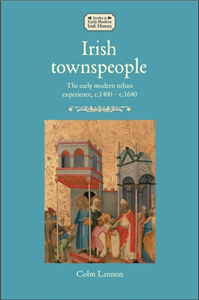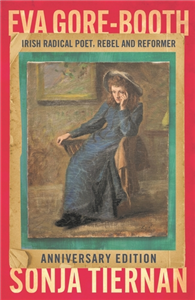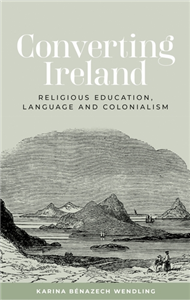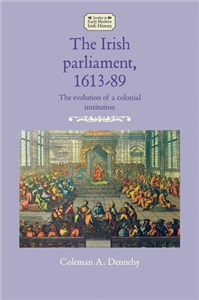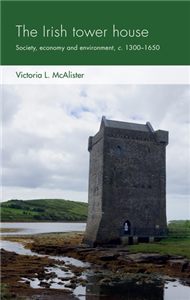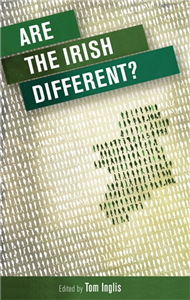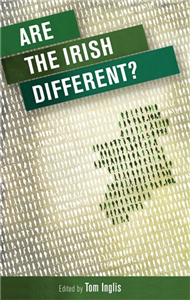Your Search Results
-
Promoted Content
-
Promoted ContentHumanities & Social SciencesMay 2026
Irish townspeople
The early modern urban experience, c.1400–c.1640
by Colm Lennon
Through a series of innovative perspectives, this book examines how early modern Irish townspeople experienced the urban world through a range of family and associational ties. Migrants inducted through town citizenship and marriage bonded more closely as sisters or brothers of confraternities and guilds, consolidating parish membership. Civic religion saw the integration of religion with town politics and councils, and monastic charity of the friars' hospitals preceded the era of modern municipal welfare. In circumstances of the alienation of the long-settled Catholic townspeople from the state's religious and political Reformation in the seventeenth century, they drew sustenance from the continuity of institutions such as colleges, fraternities and hospitals and forms of coexistence with Protestant fellow-citizens.
-
 Trusted Partner
Literature & Literary StudiesFebruary 2023
Trusted Partner
Literature & Literary StudiesFebruary 2023Imagining the Irish child
Discourses of childhood in Irish Anglican writing of the seventeenth and eighteenth centuries
by Jarlath Killeen
This book examines the ways in which ideas about children, childhood and Ireland changed together in Irish Protestant writing of the seventeenth and eighteenth centuries. It focuses on different varieties of the child found in the work of a range of Irish Protestant writers, theologians, philosophers, educationalists, politicians and parents from the early seventeenth century up to the outbreak of the 1798 Rebellion. The book is structured around a detailed examination of six 'versions' of the child: the evil child, the vulnerable/innocent child, the political child, the believing child, the enlightened child, and the freakish child. It traces these versions across a wide range of genres (fiction, sermons, political pamphlets, letters, educational treatises, histories, catechisms and children's bibles), showing how concepts of childhood related to debates about Irish nationality, politics and history across these two centuries.
-
 Trusted Partner
Humanities & Social SciencesFebruary 2017
Trusted Partner
Humanities & Social SciencesFebruary 2017Scottishness and Irishness in New Zealand since 1840
by Angela McCarthy, Andrew Thompson, John M. MacKenzie
This book examines the distinctive aspects that insiders and outsiders perceived as characteristic of Irish and Scottish ethnic identities in New Zealand. When, how, and why did Irish and Scots identify themselves and others in ethnic terms? What characteristics did the Irish and the Scots attribute to themselves and what traits did others assign to them? Did these traits change over time and if so how? Contemporary interest surrounding issues of ethnic identities is vibrant. In countries such as New Zealand, descendants of European settlers are seeking their ethnic origins, spurred on in part by factors such as an ongoing interest in indigenous genealogies, the burgeoning appeal of family history societies, and the booming financial benefits of marketing ethnicities abroad. This fascinating book will appeal to scholars and students of the history of empire and the construction of identity in settler communities, as well as those interested in the history of New Zealand.
-
 Trusted Partner
Biography & True StoriesMarch 2026
Trusted Partner
Biography & True StoriesMarch 2026Eva Gore-Booth: Irish radical poet, rebel and reformer
Anniversary edition
by Sonja Tiernan
An acclaimed biography of poet, pacifist and political firebrand Eva Gore-Booth. The Irish poet and activist Eva Gore-Booth (1870-1926) led a life defiantly at odds with her aristocratic origins. Choosing to live and work among the poor of Manchester, she campaigned on behalf of barmaids, circus performers, flower sellers and pit-brow lasses, her partner, Esther Roper, at her side. Gore-Booth was tireless in her pursuit of justice. She was a militant pacifist during the First World War, a champion of Irish independence and a pioneering thinker on gender and sexuality. She was also a prolific author, publishing nineteen volumes of poetry and prose that reflect the full force of her radical convictions. Featuring a new preface that situates Gore-Booth's life and work in the context of our current political climate, this biography reclaims her place as a significant figure of Anglo-Irish letters and an unsung hero of LGBT+ history.
-
 Trusted Partner
Literature & Literary StudiesMarch 2009
Trusted Partner
Literature & Literary StudiesMarch 2009Irish Literature Since 1990
by Michael Parker, Scott Brewster
-
 Trusted Partner
Humanities & Social SciencesApril 2026
Trusted Partner
Humanities & Social SciencesApril 2026Converting Ireland
Religious education, language and colonialism
by Karina Bénazech Wendling
Karina Bénazech Wendling offers a re-assessment of 'souperism'-the long-debated claim that food was used to convert Irish Catholics to Protestantism during the Great Famine. Focusing on the Irish Society for Promoting the Education of the Native Irish through their Own Language, the first group labeled 'soupers' in 1841, she uncovers a more complex picture. Rather than a mere tool of British cultural imperialism, the Society had a deep engagement with the Irish language and Bible translation, while also encouraging religious conversions in the West. The book explores the Society's role in Ireland's religious and political landscape, the rise of Catholic counter-missions, and nationalist resistance. Offering fresh insights into Ireland's religious history and global missionary movements, this book is essential for scholars of Irish studies, interdenominational relations, and education in Ireland.
-
 Trusted Partner
Humanities & Social SciencesAugust 2022
Trusted Partner
Humanities & Social SciencesAugust 2022The Irish parliament, 1613–89
The evolution of a colonial institution
by Coleman A. Dennehy
The Irish parliament was both the scene of frequent political battles and an important administrative and legal element of the state machinery of early modern Ireland. This institutional study looks at how parliament dispatched its business on a day-to-day basis. It takes in major areas of responsibility such as creating law, delivering justice, conversing with the executive and administering parliamentary privilege. Its ultimate aim is to present the Irish parliament as one of many such representative assemblies emerging from the feudal state and into the modern world, with a changing set of responsibilities that would inevitably transform the institution and how it saw both itself and the other political assemblies of the day.
-
 Trusted Partner
Humanities & Social SciencesApril 2021
Trusted Partner
Humanities & Social SciencesApril 2021The Irish tower house
Society, economy and environment, c. 1300–1650
by Victoria L. McAlister
The Irish tower house examines the social role of castles in late-medieval and early modern Ireland. It uses a multidisciplinary methodology to uncover the lived experience of this historic culture, demonstrating the interconnectedness of society, economics and the environment. Of particular interest is the revelation of how concerned pre-modern people were with participation in the economy and the exploitation of the natural environment for economic gain. Material culture can shed light on how individuals shaped spaces around themselves, and tower houses, thanks to their pervasiveness in medieval and modern landscapes, represent a unique resource. Castles are the definitive building of the European Middle Ages, meaning that this book will be of great interest to scholars of both history and archaeology.
-
 Trusted Partner
Humanities & Social SciencesJune 2021
Trusted Partner
Humanities & Social SciencesJune 2021Na Fianna Éireann and the Irish Revolution, 1909–23
by Marnie Hay
-
 Trusted Partner
Humanities & Social SciencesJanuary 2023
Trusted Partner
Humanities & Social SciencesJanuary 2023Democracy and dissent in the Irish Free State
by Jason Knirck
-
 Trusted Partner
Trusted Partner
-
 Trusted Partner
Literature & Literary StudiesJune 2017
Trusted Partner
Literature & Literary StudiesJune 2017Charles Robert Maturin and the haunting of Irish romantic Fiction
by Christina Morin
-
 Trusted Partner
Trusted Partner
-
 Trusted Partner
Humanities & Social SciencesOctober 2016
Trusted Partner
Humanities & Social SciencesOctober 2016Medicine, health and Irish experiences of conflict, 1914–45
by David Durnin, Ian Miller
-
 Trusted Partner
Cultural studiesNovember 2014
Trusted Partner
Cultural studiesNovember 2014Are the Irish different?
by Edited by Tom Inglis
This book examines the extent and nature of Irish social and cultural difference. It is a collection of twenty-three short essays written in a clear and accessible manner by human scientists who are international experts in their area. The topics covered include the nature of Irish nationalism and capitalism, the Irish political elite, the differences and similarities of the Irish family, the upsurge in immigration, Northern Ireland, the Irish diaspora, the Irish language, sport, music and many other topics. The book will be bought by those who have an academic and personal interest in Irish Studies. It will be attractive to those who are not familiar with the theories and methods of the human sciences and how they can shine a light on the transformations that have taken place in Ireland. Tom Inglis, the editor of the collection, is a sociologist who has written extensively on Irish culture and society.
-
 Trusted Partner
Humanities & Social SciencesNovember 2014
Trusted Partner
Humanities & Social SciencesNovember 2014Are the Irish different?
by Tom Inglis
This book examines the extent and nature of Irish social and cultural difference. It is a collection of twenty-three short essays written in a clear and accessible manner by human scientists who are international experts in their area. The essays cover topics covered include the nature of Irish nationalism and capitalism, the Irish political elite, the differences and similarities of the Irish family, the upsurge in immigration, Northern Ireland, the Irish diaspora, the Irish language, sport, music and many other topics. The book will be bought by those who have an academic and personal interest in Irish Studies. It will be attractive to those who are not familiar with the theories and methods of the human sciences and how they can shine a light on the transformations that have taken place in Ireland. Tom Inglis, the editor of the collection, is a sociologist who has written extensively on Irish culture and society. ;
-
 Trusted Partner
Humanities & Social SciencesMarch 2017
Trusted Partner
Humanities & Social SciencesMarch 2017'An Irish empire'?
Aspects of Ireland and the British Empire
by Sally Visick
This volume, which explores aspects of the experience of Ireland and Irish people within the British Empire, addresses a central concern of modern Irish scholarship. Much academic writing about Ireland, its history and culture is dominated by the vocabulary of imperialism. Engels described Ireland as England's first colony. Contemporary observers frequently characterise it as having a post-colonial society. Ireland, on the other hand, was also part of the metropolitan core of the Empire and supplied many of its soldiers, settlers and administrators. The paradox that Ireland was both 'imperial' and 'colonial' lies at the heart of this book which includes studies of Irish service in the Empire as well as the impact of imperial concerns in Ireland. Concentrating on the period since the mid-nineteenth century, the scope of the volume is impressively broad. Popular culture, sport and film are investigated, as well as business history and the military and political 'sinews of Empire'. The book will be of particular value to institutions teaching Irish and British history to degree level and the growing number of Irish studies courses being offered in Great Britain and North America.
-
 Trusted Partner
Humanities & Social SciencesJanuary 2017
Trusted Partner
Humanities & Social SciencesJanuary 2017The West must wait
County Galway and the Irish Free State, 1922–32
by Una Newell
The West must wait presents a new perspective on the development of the Irish Free State. It extends the regional historical debate beyond the Irish revolution and raises a series of challenging questions about post-civil war society in Ireland. Through a detailed examination of key local themes - land, poverty, politics, emigration, the status of the Irish language, the influence of radical republicans and the authority of the Catholic Church - it offers a probing analysis of the socio-political realities of life in the new state. This book opens up a new dimension by providing a rural contrast to the Dublin-centred views of Irish politics. Significantly, it reveals the level of deprivation in local Free State society with which the government had to confront in the west. Rigorously researched, it explores the disconnect between the perceptions of what independence would deliver and what was achieved by the incumbent Cumann na nGaedheal administration.
-
 Trusted Partner
Humanities & Social SciencesMarch 2008
Trusted Partner
Humanities & Social SciencesMarch 2008The Irish voter
The nature of electoral competition in the Republic of Ireland
by Michael Marsh, Richard Sinnott, John Garry, Fiachra Kennedy
This pioneering analysis uses the results from the first ever Irish election study to provide a comprehensive survey of the motives, outlook and behaviour of voters in the Republic of Ireland. Building on the foundations laid down by previous work on comparative electoral behaviour, it explores long-term influences on vote choice, such as party loyalties and enduring values, as well as short-term ones, such as the economy, the party leaders and the candidates themselves. It also examines how people use their vote and why so many people do not vote at all. Many features of Irish elections make such a detailed study particularly important. The single transferable vote system allows voters an unusual degree of freedom to pick the candidates they prefer, while electoral trends observed elsewhere can be found in a more extreme form in Ireland. For example, attachment to parties is very low, differences between them are often obscure, candidate profiles are very high and turnout is falling rapidly. However, Irish elections defy international trends in other respects, most notably in the degree of personal contact parties and candidates make with their voters. Findings are presented in a manner that is highly accessible to anyone with an interest in elections, electoral systems and electoral behaviour. The book is essential reading for anyone interested in Irish politics and is an important text for students of European Politics, Parties and Elections, Comparative Politics and Political Sociology. ;



